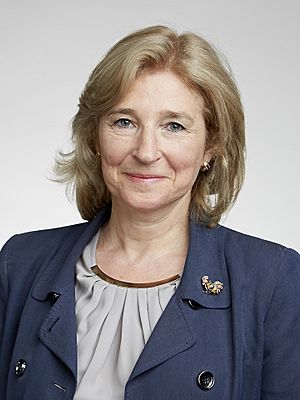Polina Bayvel facts for kids
Quick facts for kids
Polina Bayvel
|
|
|---|---|

Bayvel in 2016
|
|
| Born | 14 April 1966 |
| Nationality | British |
| Citizenship | British |
| Education | Hasmonean High School for Girls |
| Alma mater | University College London (BSc, PhD) |
| Children | Two |
| Awards | Clifford Paterson Lecture (2014) |
| Scientific career | |
| Fields |
|
| Institutions | Nortel Standard Telephones and Cables University College London |
| Thesis | Stimulated Brillouin scattering in single mode optical fibre ring resonators (1990) |
Polina Bayvel is a brilliant British engineer and professor. She works at University College London (UCL) and is an expert in optical communications. Her work helps make the internet super fast! She has done amazing things to design and improve how we send huge amounts of information using light through special cables.
Contents
Polina Bayvel's Early Life and School
Polina Bayvel was born in Kharkiv, Ukraine, on April 14, 1966. She grew up there and in St. Petersburg, Russia, until 1978. Her father was a physicist, and her mother studied textiles.
She moved to England and went to Hasmonean High School for Girls. Later, she studied at University College London. She earned her first degree in engineering in 1986. Then, she completed her PhD in 1990. After that, she received a special fellowship to study in Moscow, Russia, focusing on fiber optics.
Amazing Research and Career
Polina Bayvel's main goal in her research is to make internet connections faster and more powerful. She works on how to send huge amounts of data using optical fibres. These are tiny glass strands that carry information using light.
Making the Internet Faster
She has done important work on how to use different colors (or wavelengths) of light to send many signals at once. This is like having many different lanes on a highway for data. Her ideas have been used in real-world internet systems. These systems are super important for how the internet works today. They help it grow bigger and faster all the time.
Testing New Technologies
One of her projects, called "Initiate," is testing new ways to make internet connections even faster and more secure. This project aims to try out these new technologies on a national scale. Her research has received funding from the Engineering and Physical Sciences Research Council (EPSRC).
Awards and Special Honours
Polina Bayvel has received many important awards for her work. These awards show how much her contributions have helped the world of engineering and technology.
- In 2002, she won the Institute of Physics Clifford Paterson Medal and Prize.
- She was also chosen as a Fellow of the Royal Academy of Engineering in 2002.
- In 2013, she received an award from the Institute of Electrical and Electronics Engineers (IEEE) for her engineering achievements.
- The University of South Wales gave her an honorary science degree in 2014.
- She gave the important Clifford Paterson Lecture in 2014.
- In 2015, she won the Royal Academy of Engineering Colin Campbell Mitchell Award.
- She became a Fellow of the Royal Society (FRS) in 2016. This is a very high honor for scientists.
- In 2017, she was made a Commander of the Order of the British Empire (CBE). This was for her great service to engineering.
- From 2020 to 2022, she served on the Board of Directors for The Optical Society.
- In 2023, Polina Bayvel was awarded the Royal Society Rumford Medal. This medal recognized her groundbreaking work in physics and optics. Her research helped create the super-fast optical communication systems we use today. She is the first woman to ever receive this medal since it started in 1800!
Personal Life
Polina Bayvel has two sons.
 | Delilah Pierce |
 | Gordon Parks |
 | Augusta Savage |
 | Charles Ethan Porter |

